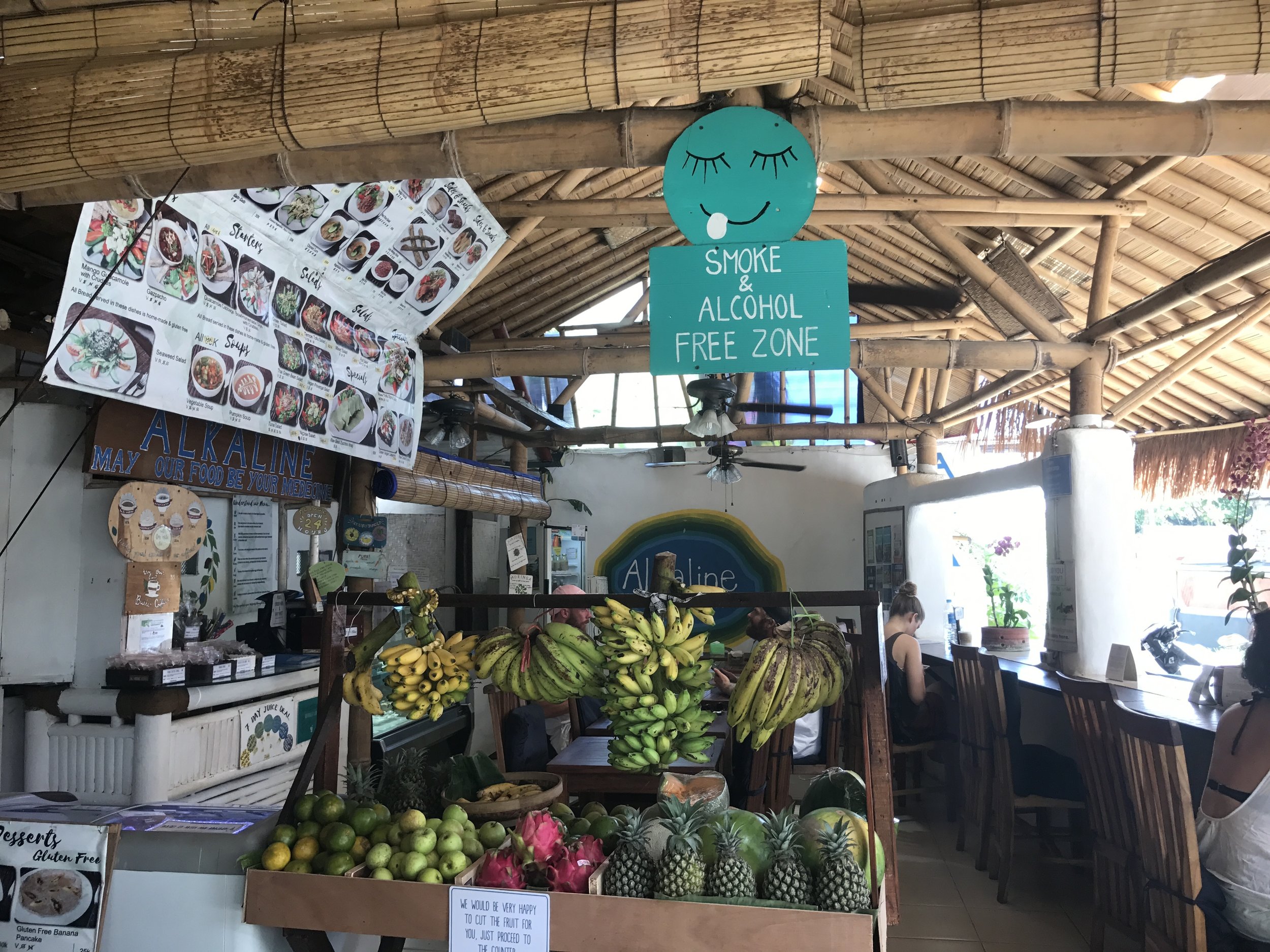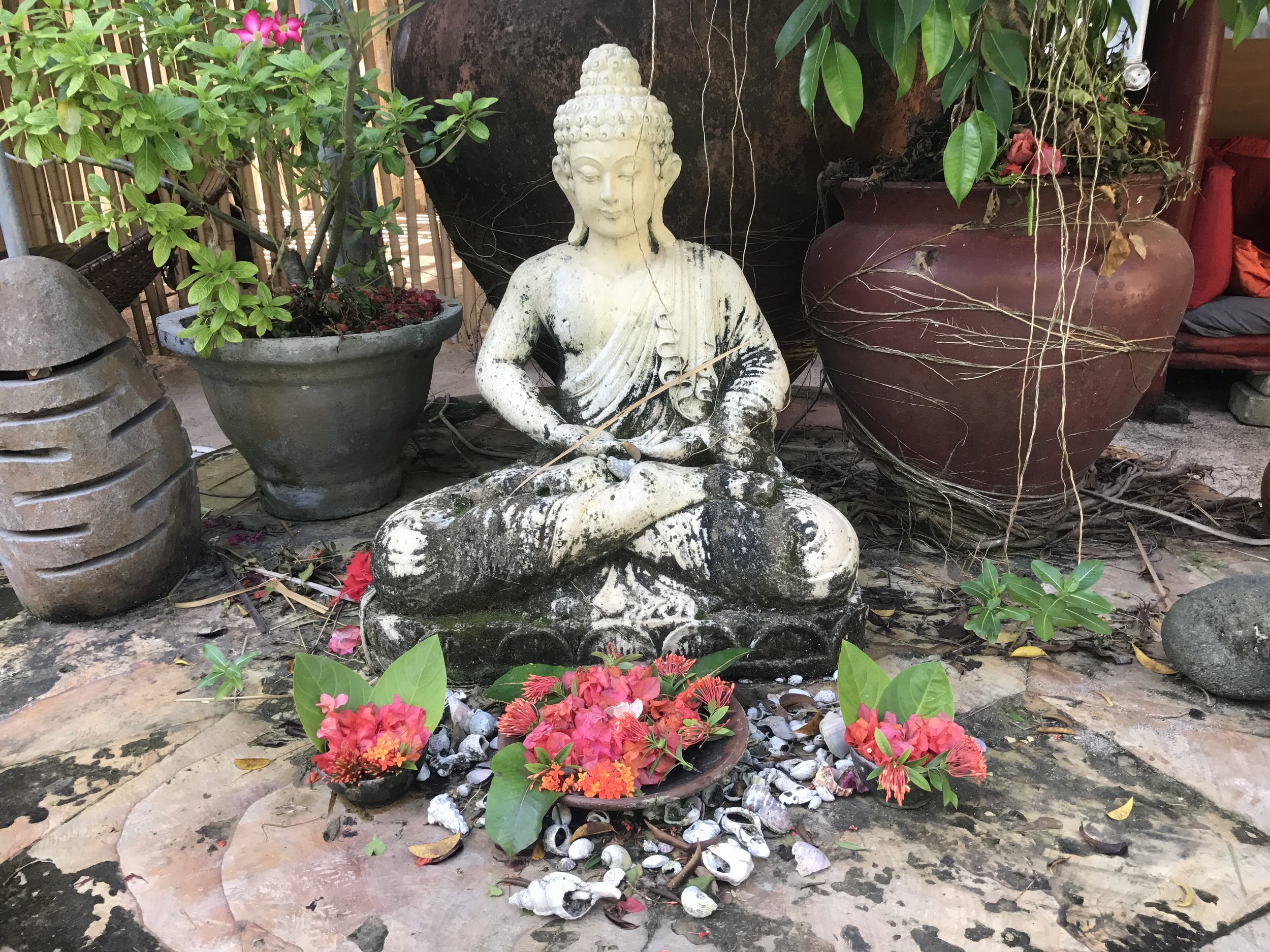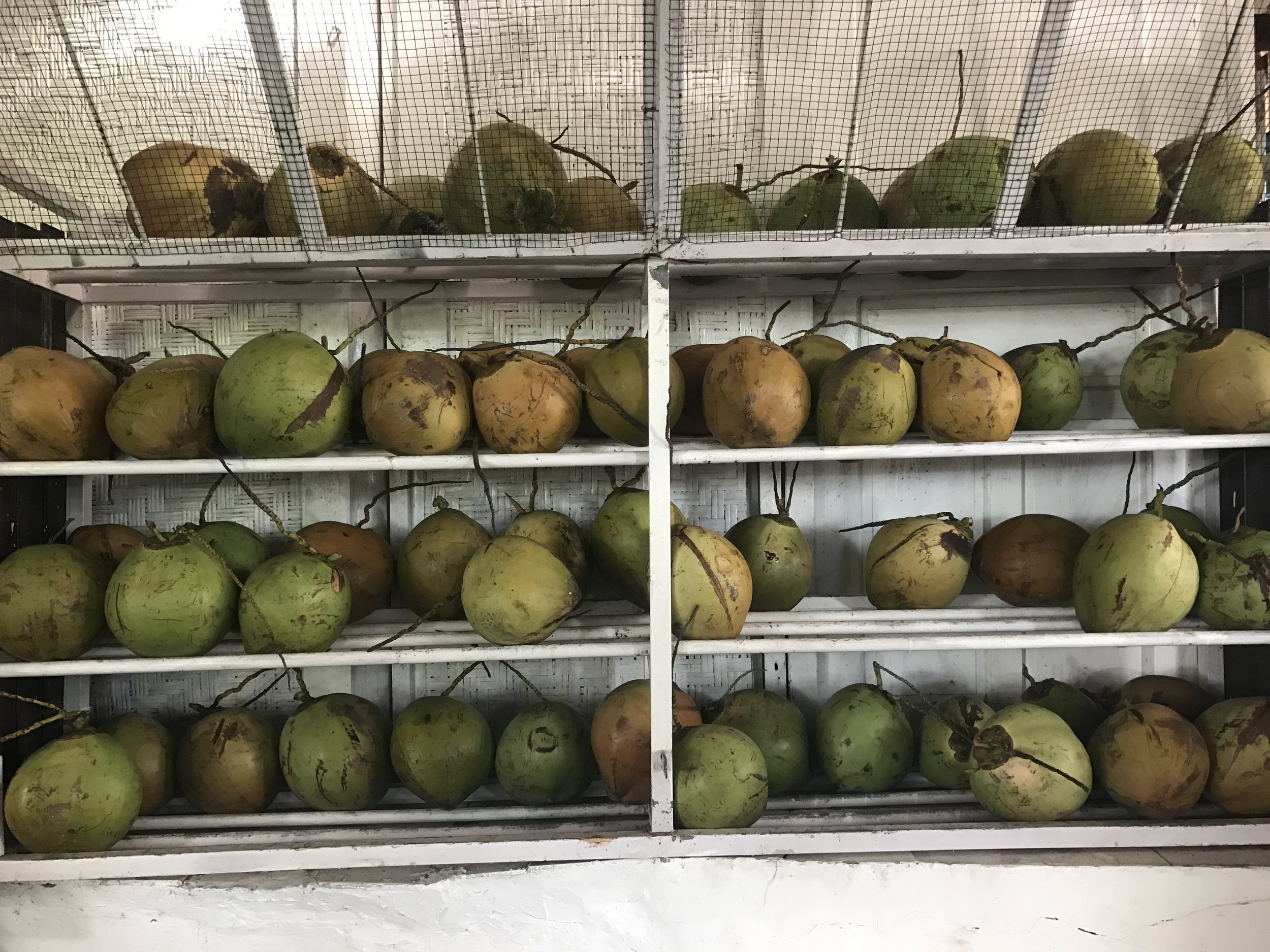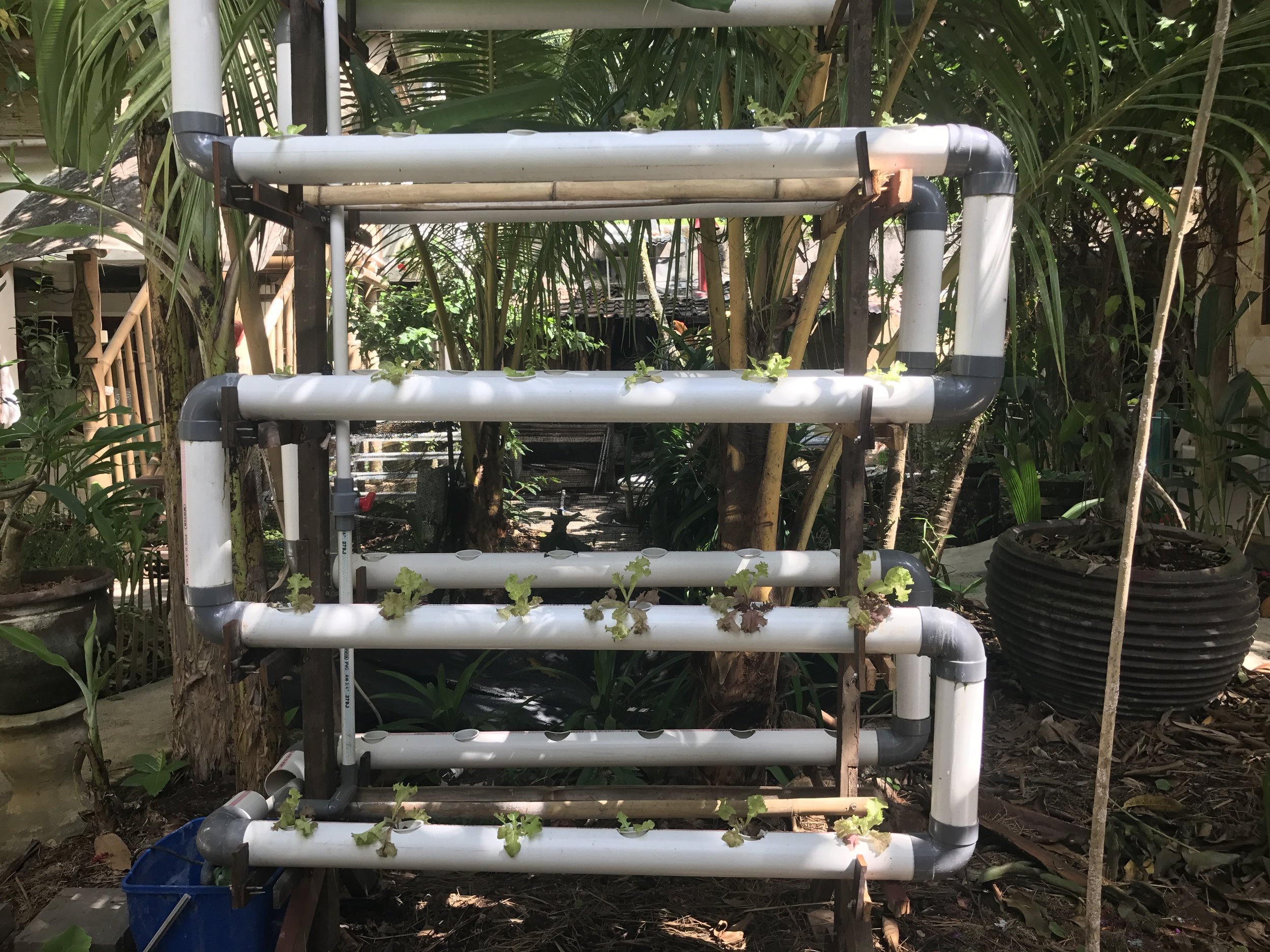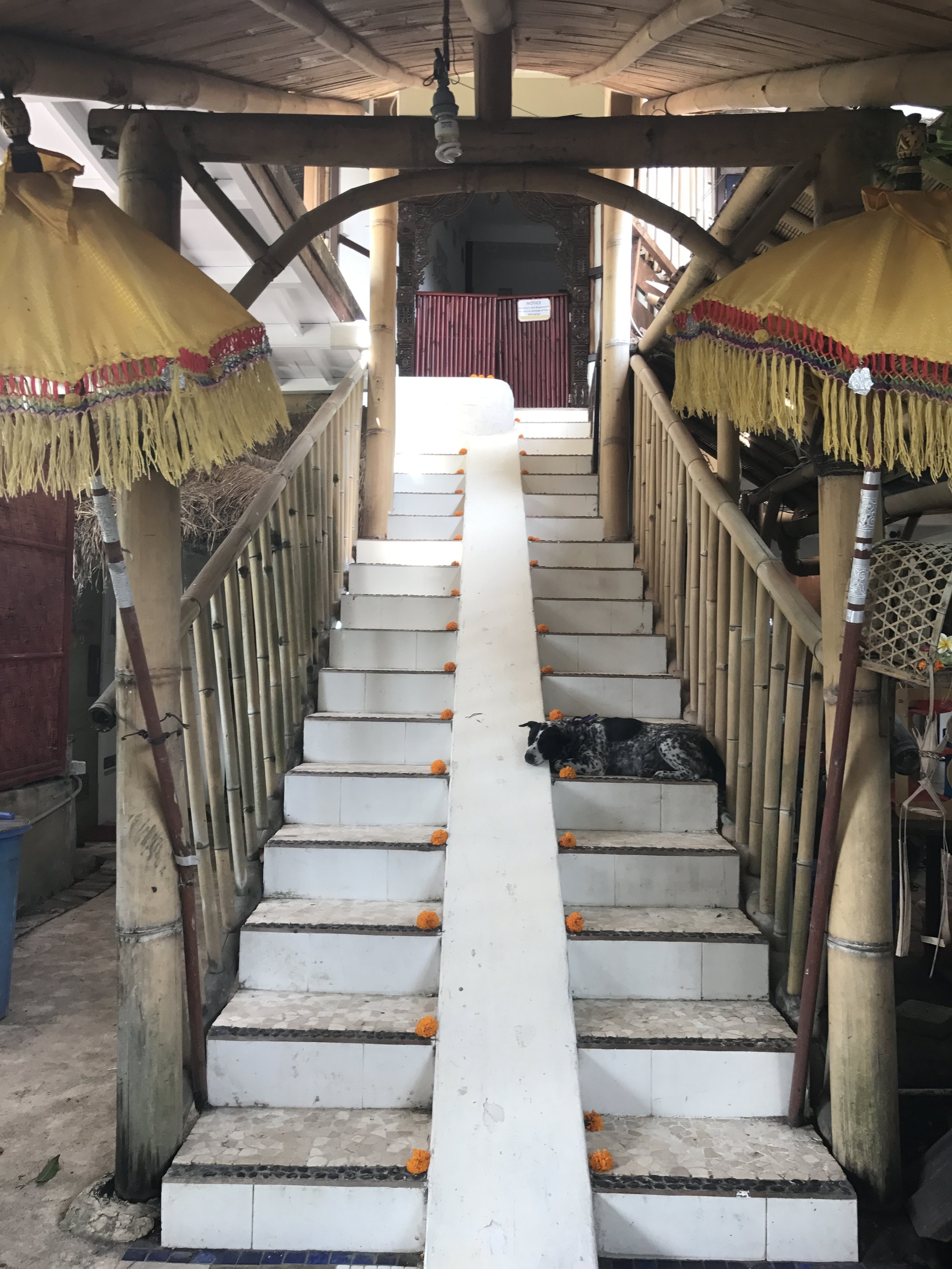INDONESIA
Located in Canggu, home to some of Bali’s premiere surf, international restaurants, co-working spaces, temples, tattoo studios, shopping and nightlife, Serenity Eco Guesthouse focuses on just that: Serenity. Only a five-minute walk to Batu Balong Beach, quietly tucked away from the noisy beaches in Kuta, while still being 45-minutes from the airport and an hour to Ubud, Serenity is a sanctuary for travelers looking for an affordable, quiet, nourishing and soulful space to rest their heads.
While planning our trip to Asia we scoured the web for insight on where to stay in Bali, poring over reviews of beaches, neighborhoods and accommodations until we found Serenity, which promised to provide the perfect mix of location, activities and health food we sought. Though we had only planned to stay five days at the guesthouse, it didn’t take long for us to extend our stay. In total, we spent about five weeks here in five different room types on two occasions, bookending our trip with plenty of yoga, clean food, relaxation and beach time. We recommend staying at least five days to truly soak up all Serenity has to offer. For a closer look at the guesthouse watch our video tour.
AFFORDABLE ACCOMMODATION IN A BEAUTIFUL SETTING
Founded by owners Daniel & Yatna on their personal property in 2009, this family run business now has dozens of employees and three additional branches of guest rooms in short walking distance from the main complex.
Despite increased demand for rooms, the guesthouse never feels crowded. The yoga studios are spacious, guests are always willing to share a table in the health conscious Alkaline Restaurant, and the gorgeous pool is surrounded by plenty of seating. Every room is equipped with a safety box, and comes either with full or discounted breakfast. Guests are invited to store food in shared refrigerators, and a shuttle service is provided between the main house and branches for added convenience.
While eco resorts may feel out of reach for many budget travelers, Serenity instills the feeling that sustainability is achievable for everyone, and at a reasonable price. Presently, Serenity’s dorms cost about $10 a night, and private rooms range from $15 - $30 per night. Check out their website for the most up to date prices.
YOGA & WELLNESS
The guesthouse pays careful attention to wellness for the body, mind, spirit, and environment. A dozen yoga and meditation classes are scheduled daily. Taught by Balinese, Indonesian and international teachers, classes range from ashtanga, mysore, hatha, yin, and various vinyasas, to yoga for surfers, chakra flows, aerial yoga, life coaching workshops, gong meditation, acroyoga and more. A meditation room, massage, surf lessons, bicycle and motorbike rentals are also available.
A variety of 100% organic, natural and mindful oriented products are sold on-site, including: virgin coconut oil, mosquito repellent, activated bamboo charcoal (a detoxing purifier), reusable straws, sunscreen, and books on consciousness.
Serenity’s Alkaline Restaurant offers an organic menu filled with raw, vegan, vegetarian, and gluten free items. Meat options, are available, too. Super foods abound, from electrolyte packed coconuts, to iron-rich moringa (a native plant grown on-site), to wheatgrass shots, turmeric juice, a variety of homemade detox juices, multiple brands of locally made kombucha in many flavors (including Serenity’s very own), alkaline water, and divine cacao bars made in Ubud, to name a few. Daily and weekly specials add even more variety. But best of all, it’s obvious the food is made with love.
SUSTAINABILITY – ADDRESSING BALI’S DESPERATE NEED
Sustainability is another of Serenity’s core values, and this is seen throughout the property, from the banyan tree that stands at the entrance, to the composting and recycling bins placed throughout the common areas, the cleaning products used, the array of eco-friendly goods sold on-site, and the reminders in every space to reduce energy use.
The growing movement toward eco-tourism is of international importance, and especially in rapidly developing areas like Bali where there is little pre-existing infrastructure to handle the intense growth and resulting waste generated by the industry. A shortage of waste management systems coupled with a lack of community awareness on how to properly dispose of mass quantities of garbage – 20,000 cubic meters of trash is discarded daily – is a huge problem in Bali, and notably so in the beach communities. It’s estimated that seventy-five percent of trash is not collected by official services, meaning it’s likely burned, washed into waterways, or otherwise illegally dumped. This problem is only exacerbated by the large quantities of non-biodegradable trash produced by the booming tourism sector.
In 2016, Bali hosted close to 5 million foreign tourists, a number that surpassed the island’s total population in 2014. While the industry has a positive impact on Bali’s economy, mass tourism takes a serious toll on the paradisiacal environment, which is one of the very reasons travelers make the trip to the ‘island of the gods' in the first place. Offering over 6,000 hotels on 2,175 square miles, the tourist industry absorbs approximately 65% of Bali’s total water supply, with four- and five-star hotels requiring at least 50,000 liters of clean water every day, according to the Bali Hotel Association. Despite the stresses tourism puts on the island, the Balinese remain welcoming of tourists, and an increasing number of organizations are cropping up to combat the problem.
While the hotel business, in particular, is in desperate need of improvement, this is an area where Serenity truly shines. The Eco Guesthouse offers conscious travelers the ability to be good stewards in their host country by making a positive impact on the local environment, while still having fun, eating well, and staying in budget.
Serenity boasts a number of sustainable practices focused on reducing, reusing and recycling. Rather than burning trash and grass, they compost organic waste, and recycle used plastic bottles and paper at Eco Bali. Many other items are reused, too, including glass, scrap wood and plastic bags. Local building materials, bamboo, and plastic bottles are used in the infrastructure, and gorgeous works of art are created from broken materials that would be otherwise trashed. Inorganic waste is further reduced by the restaurant, which provides biodegradable takeaway boxes.
At Serenity, water is saved by staggering linen washes in guest rooms. Drying linens in the sun further reduces energy. Low energy light bulbs and natural septic tanks are also used.
The charming grounds incorporate permaculture gardens, an organic nursery, a wastewater garden, and organic worm farm. The gardens provide a variety of fresh fruit and medicinal herbs, and incorporate homemade organic fertilizers. They are kept mosquito and pest free by growing neem, lemongrass and zodiac, and by using garlic spray and neem oil instead of toxic chemicals.
In addition to all this, the staff makes a point of using eco-friendly products for their dish and linen washing, and to keep their beautiful swimming pool clean and pristine. Guests are asked to do their part by washing off inorganic sunscreen and bug sprays before entering the pool, hanging their towels out to dry, composting, recycling, and reducing energy by turning off lights, AC and fans when not in use.
At Serenity, you know sustainability is a team effort in which we all play a part. As a guest, patron at the Alkaline Café, or a student in a yoga class, you know that you are part of a movement to make a positive impact on the world while minimizing your global footprint.
MAKING A DIFFERENCE
When you stay at Serenity you know you're helping to care for the world while taking care of yourself. The feeling you get throughout your visit is one of mindfulness and intention. The thoughtful, friendly staff, artful attention to detail – from the yin-yangs, murals, and mirror mosaics, to the labeling of plants and information on super foods placed around the restaurant – and intuitive sense of sustainability and well-being that permeates the guesthouse all contribute to the peaceful atmosphere, making it a wonderful place to reflect, relax and grow.
SNAPSHOTS
